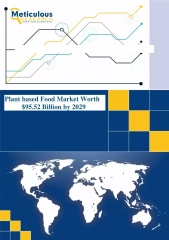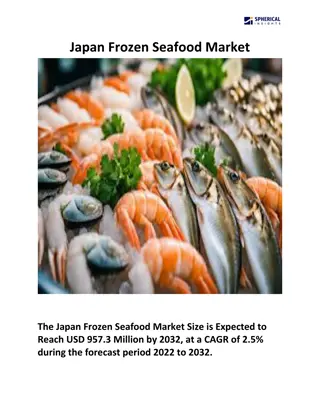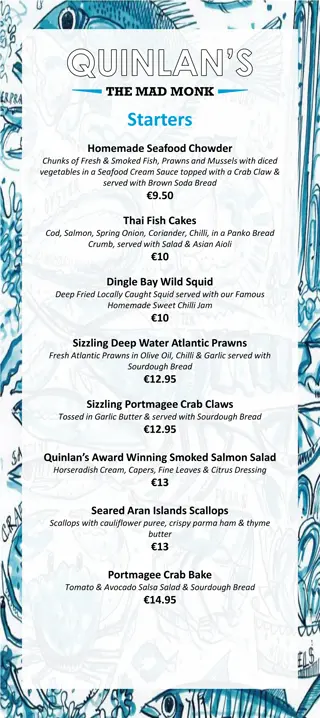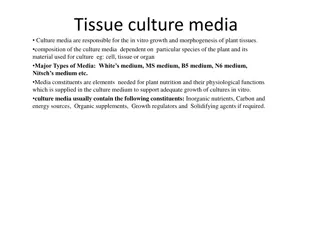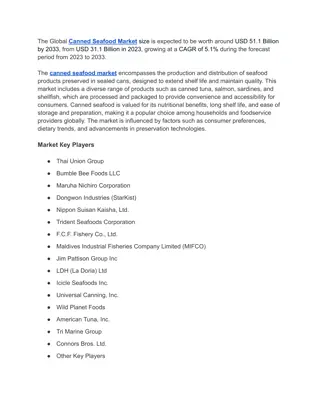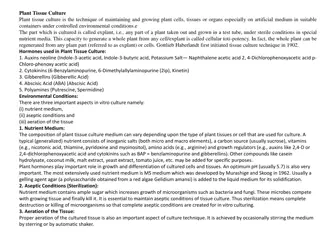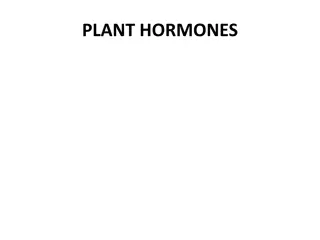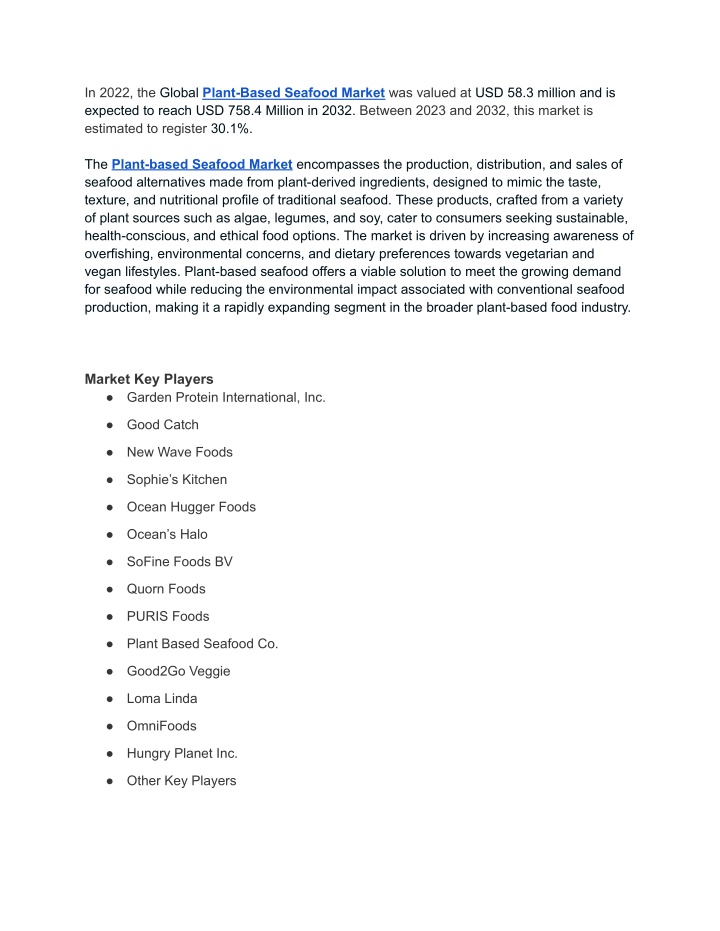
Plant-based Seafood Market
In 2022, the Global Plant-Based Seafood Market was valued at USD 58.3 million and is expected to reach USD 758.4 Million in 2032. Between 2023 and 2032, this market is estimated to register 30.1%.nClick here for request a sample : //market.us/rep
Download Presentation

Please find below an Image/Link to download the presentation.
The content on the website is provided AS IS for your information and personal use only. It may not be sold, licensed, or shared on other websites without obtaining consent from the author. If you encounter any issues during the download, it is possible that the publisher has removed the file from their server.
You are allowed to download the files provided on this website for personal or commercial use, subject to the condition that they are used lawfully. All files are the property of their respective owners.
The content on the website is provided AS IS for your information and personal use only. It may not be sold, licensed, or shared on other websites without obtaining consent from the author.
E N D
Presentation Transcript
In 2022, the Global Plant-Based Seafood Market was valued at USD 58.3 million and is expected to reach USD 758.4 Million in 2032. Between 2023 and 2032, this market is estimated to register 30.1%. The Plant-based Seafood Market encompasses the production, distribution, and sales of seafood alternatives made from plant-derived ingredients, designed to mimic the taste, texture, and nutritional profile of traditional seafood. These products, crafted from a variety of plant sources such as algae, legumes, and soy, cater to consumers seeking sustainable, health-conscious, and ethical food options. The market is driven by increasing awareness of overfishing, environmental concerns, and dietary preferences towards vegetarian and vegan lifestyles. Plant-based seafood offers a viable solution to meet the growing demand for seafood while reducing the environmental impact associated with conventional seafood production, making it a rapidly expanding segment in the broader plant-based food industry. Market Key Players Garden Protein International, Inc. Good Catch New Wave Foods Sophie s Kitchen Ocean Hugger Foods Ocean s Halo SoFine Foods BV Quorn Foods PURIS Foods Plant Based Seafood Co. Good2Go Veggie Loma Linda OmniFoods Hungry Planet Inc. Other Key Players
Click here for request a sample : https://market.us/report/plant-based-seafood-market/request-sample/ Product Form Analysis: In 2022, the fish segment held the largest market share in the plant-based seafood market at 65.3%, driven by its wide consumption, demand for sustainable alternatives, and ability to mimic the taste and texture of real fish. Plant-based fish products, such as fillets and fish sticks, appeal to eco-conscious consumers seeking vegan options. The shrimp segment is the fastest-growing, as plant-based shrimp offers a sustainable alternative to traditional shrimp farming, addressing ecological concerns like deforestation and habitat destruction. Source Analysis: The soy segment led the plant-based seafood market in 2022 with a 37.2% share, thanks to its robust nutritional profile, including high protein and essential amino acids, and its familiarity in the plant-based food industry. Soy s health benefits, such as low saturated fat and high fiber content, make it a trusted source. Pea followed soy in market share, offering significant health benefits like high protein, vitamins, and minerals that support immune function, bone health, and cardiovascular well-being. Distribution Channel Analysis: Online retail is expected to dominate the plant-based seafood market with a CAGR of 45.2% due to its convenience, accessibility, and detailed product information. Consumers prefer the ease of online shopping and the ability to explore various products from home. Supermarkets/hypermarkets held the largest market share in 2022, providing a tangible shopping experience and the convenience of one-stop
shopping. End-User Analysis: The residential segment dominates the plant-based seafood market, driven by environmentally conscious consumers seeking sustainable diets and the convenience of home meal preparation. The commercial segment is the fastest-growing, with increased demand for plant-based seafood in the hospitality, food service, and catering industries, which are expanding their ethical and diverse menu offerings. Key Market Segments: Based on the Product Form Fish Shrimps Crabs Scallops Other Product Forms Based on Source Soy Wheat Pea Konjac Seaweed Lentils Legumes Other Sources
Based on the Distribution Channel Supermarkets/Hypermarkets Convenience Stores HoReCa Online Retail Based on End-User Residential Commercial Drivers : Ethical and environmental concerns are reshaping consumption patterns, significantly driving the global plant-based seafood market. Consumers are increasingly seeking sustainable alternatives due to worries about overfishing and marine ecosystem impacts. Plant-based seafood offers a guilt-free option with lower saturated fats and cholesterol levels, providing a comparable culinary experience while addressing ethical concerns. Restraints: The price disparity between plant-based and conventional seafood is a significant restraint in the market. Higher costs of specialized ingredients and production processes make plant-based options more expensive, potentially deterring price-sensitive consumers. To bridge this gap, manufacturers need to achieve economies of scale, optimize production processes, and develop cost-effective sourcing strategies. Opportunity: The demand for convenient, ready-to-eat plant-based seafood solutions presents a major opportunity. As busy lifestyles become more common, consumers seek hassle-free meal
options that align with health and sustainability goals. Developing pre-cooked, pre-seasoned, and easily prepared plant-based seafood products can attract a broader audience, including working professionals and families, making ethical and wholesome dining more accessible. Trends: A key trend in the plant-based seafood market is the fusion of global cuisines and cross-cultural flavors. Chefs and manufacturers are incorporating diverse culinary influences into plant-based seafood products, creating innovative dishes like Asian-inspired sushi and Mediterranean-style stews. This trend appeals to adventurous eaters and culturally diverse consumers, driving market growth by offering a rich variety of enticing and novel experiences.


